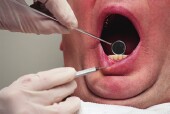- 8 Ways to Increase Dopamine Naturally
- 7 Best Breads for Maintaining Stable Blood Sugar
- Gelatin vs. Collagen: Which is Best for Skin, Nails, and Joints?
- The Long-Term Effects of Daily Turmeric Supplements on Liver Health
- Could Your Grocery Store Meat Be Causing Recurring UTIs?
- Are You Making This Expensive Thermostat Error This Winter?
- Recognizing the Signs of Hypothyroidism
- 10 Strategies to Overcome Insomnia
- Could Artificial Sweeteners Be Aging the Brain Faster?
- Techniques for Soothing Your Nervous System
Typical Gum Disease Treatments Won’t Help Ease Diabetes, Study Finds


Typical, nonsurgical treatment of gum disease in people with type 2 diabetes will not improve their blood-sugar control, a new study suggests.
There’s long been a connection between gum disease and wider health issues, and experts say a prior study had offered some evidence that treatment of gum disease might enhance blood-sugar control in patients with diabetes.
Nearly half of Americans over age 30 are believed to have gum disease, and people with diabetes are at greater risk for the problem, the researchers said. Well-controlled diabetes is associated with less severe gum disease and a lower risk for progression of gum disease, according to background information in the study.
But would an easing of gum disease help control patients’ diabetes? To find out, the researchers, led by Steven Engebretson of New York University, tracked outcomes for more than 500 diabetes patients with gum disease who were divided into two groups.
One group’s gum disease was treated using scaling, root planing and an oral rinse, followed by further gum disease treatment after three and six months. The other group received no treatment for their gum disease.
Scaling and root planing involves scraping away the tartar from above and below the gum line, and smoothing out rough spots on the tooth’s root, where germs can collect, according to the U.S. National Institutes of Health.
After six months, people in the treatment group showed improvement in their gum disease. There was no difference, however, in blood-sugar control between the two groups, according to the findings, which were published in the Dec. 18 issue of the Journal of the American Medical Association.
These findings do not support the use of nonsurgical gum disease treatment to improve blood-sugar control in people with diabetes, the researchers said.
Experts said the finding was in line with what is known on the subject.
“The results don’t surprise me,” said Dr. Gerald Bernstein, director of the Diabetes Education Program at Beth Israel Medical Center in New York City. “[Gum disease] requires physical intervention to remove offending plaques and microinfection that does not easily clear with brushing and rinsing.”
What is really important is how inflammation linked to gum disease is related to wider cardiac inflammation, Bernstein said. That relationship might influence the rate at which artery-hardening plaques are deposited in blood vessels.
Dr. Spyros Mezitis, an endocrinologist at Lenox Hill Hospital in New York City, said it’s well known that gum disease is “associated with worsening of [blood-sugar] control in diabetics.”
But the current study suggests that “[gum] treatment improves the common disease and preserves teeth but should not be used to control diabetes,” he said.
“Larger studies are needed to confirm these findings,” Mezitis added.
More information
The U.S. National Institute of Dental and Craniofacial Research has more about gum disease’s causes, symptoms and treatments.
Source: HealthDay
Copyright © 2026 HealthDay. All rights reserved.










